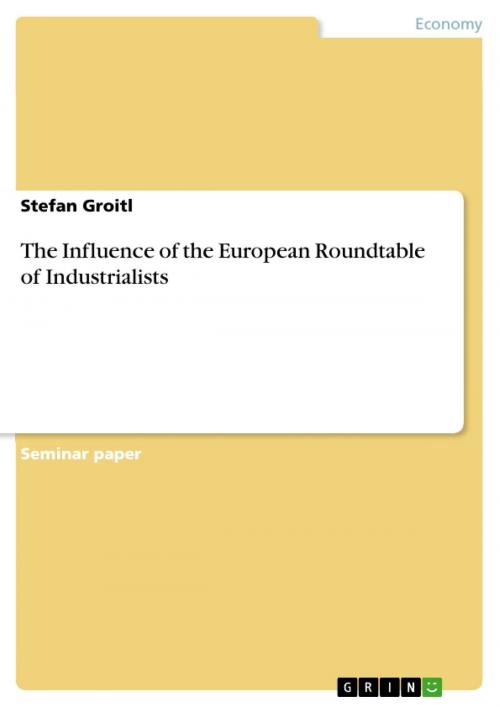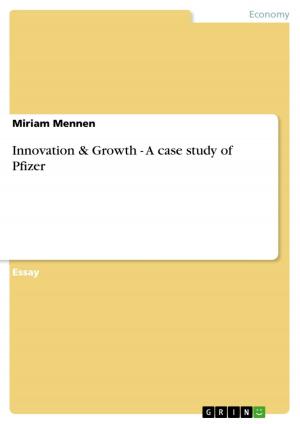The Influence of the European Roundtable of Industrialists
Business & Finance, Economics, International| Author: | Stefan Groitl | ISBN: | 9783656192305 |
| Publisher: | GRIN Publishing | Publication: | May 16, 2012 |
| Imprint: | GRIN Publishing | Language: | English |
| Author: | Stefan Groitl |
| ISBN: | 9783656192305 |
| Publisher: | GRIN Publishing |
| Publication: | May 16, 2012 |
| Imprint: | GRIN Publishing |
| Language: | English |
Seminar paper from the year 2012 in the subject Economics - International Economic Relations, grade: 59, University of Southampton, language: English, abstract: There are around 1,000 business associations organized and addressed to the European Union (EU) level, which correspond to two-thirds of all EU groups (Greenwood, 2007, p.49). There is a wide range of these business groups, from unique and exclusive businesswide clubs of multinational firms (MNF) through to highly specialist interest organisations (Greenwood, 2007, p.49). The mobilisation of collective action from multinational firms is one of the most important developments in the EU and is a signal of new influential political actors at EU level (Cowles, 1998, p.108). This essay tries to outline what the European Roundtable of Industrialists (ERT) is exactly, how it was founded and whether they have substantial influence, and if so, why and how they organise it. One of the most important and influential businesswide clubs is the European Roundtable of Industrialists, which is representing around 45 multinational firms of European parentage (Cowles, 1998, p.108; Nollert, 2005, p.299). They describe themselves neither as a business lobby group, nor as a think tank (ERT, 2011). The members cover a wide range of industrial and technological sectors and are situated all over Europe (ERT, 2011). Important member firms are for example Unilever, Nestlé, Siemens, ThyssenKrupp, Philipps, Bayer and BMW (ERT, 2011; Spindler, 2002, p.17). Together they have sales figures of more than 1,000 billion Euros, provide around 6.6 million jobs (ERT, 2011) and are responsible for huge investments, not only in Europe (Richardson, 2000, p.10). The secretariat is now based in Brussels and is regularly publishing articles on different pan-European subjects (Nollert, 2005, p.299). The main concern of the ERT is the creation of conditions necessary to improve European growth and jobs (ERT, 2011).
Seminar paper from the year 2012 in the subject Economics - International Economic Relations, grade: 59, University of Southampton, language: English, abstract: There are around 1,000 business associations organized and addressed to the European Union (EU) level, which correspond to two-thirds of all EU groups (Greenwood, 2007, p.49). There is a wide range of these business groups, from unique and exclusive businesswide clubs of multinational firms (MNF) through to highly specialist interest organisations (Greenwood, 2007, p.49). The mobilisation of collective action from multinational firms is one of the most important developments in the EU and is a signal of new influential political actors at EU level (Cowles, 1998, p.108). This essay tries to outline what the European Roundtable of Industrialists (ERT) is exactly, how it was founded and whether they have substantial influence, and if so, why and how they organise it. One of the most important and influential businesswide clubs is the European Roundtable of Industrialists, which is representing around 45 multinational firms of European parentage (Cowles, 1998, p.108; Nollert, 2005, p.299). They describe themselves neither as a business lobby group, nor as a think tank (ERT, 2011). The members cover a wide range of industrial and technological sectors and are situated all over Europe (ERT, 2011). Important member firms are for example Unilever, Nestlé, Siemens, ThyssenKrupp, Philipps, Bayer and BMW (ERT, 2011; Spindler, 2002, p.17). Together they have sales figures of more than 1,000 billion Euros, provide around 6.6 million jobs (ERT, 2011) and are responsible for huge investments, not only in Europe (Richardson, 2000, p.10). The secretariat is now based in Brussels and is regularly publishing articles on different pan-European subjects (Nollert, 2005, p.299). The main concern of the ERT is the creation of conditions necessary to improve European growth and jobs (ERT, 2011).















